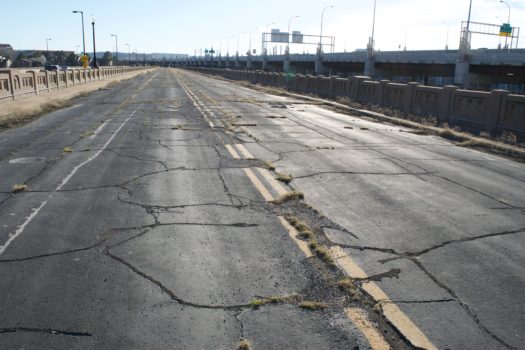
By RICK BRUNDRETT
Only three bridge projects have been completed in South Carolina with the nearly $2 billion in revenues collected under the 2017 state gas-tax-hike law, recently released transportation department records show.
And although the S.C. Department of Transportation has identified 465 out of 750 “structurally deficient” bridges statewide to be replaced, other agency records reviewed by The Nerve show that the vast majority of 66 “priority” projects in that category remain unfinished.
In passing the gas-tax-hike law, which raised the state gasoline tax by 12 cents per gallon over six years and increased other vehicle taxes and fees, lawmakers promised that the money would be used to fix the state’s crumbling roads and bridges. The latest 2-cent-per-gallon increase took effect July 1.
But of the $1.9 billion in collected revenues through May 31, only $18 million was designated by DOT for “additional” bridge projects, with just three of 16 listed bridge projects statewide completed, records show.
Separately, The Nerve’s review of DOT’s “10 Year Plan” records found that of 430 bridge projects – 356 of which are listed in a category labeled “closed and load restricted bridges” – 36, or 8.3%, have been completed. Another 257 projects, or about 60% of the total, have “TBD” (to be determined) start dates, those records show.
DOT on its website says the agency maintains more than 8,400 bridges across the state, with modern bridges “typically designed with a service life between 50 to 75 years.” Common bridge work includes concrete deck repairs, steel painting and resealing expansion joints, according to the website.
In 2018, The Nerve revealed that DOT planned to add $15 million annually to its 10-year, $1.5 billion bridge-replacement program, though not until 2024 until after an income tax credit created under the gas-tax-hike law expires. The agency at the time estimated that of the total $114 million available yearly after the credit expires, $80 million would go toward widening rural interstates.
The tax credit is intended to ease S.C. residents’ financial pain at the pump with the gas tax increase. But the credit has remained unpopular, with total claims this year projected by state revenue forecasters to be nearly $60 million less than the cap set by law, as The Nerve revealed in February.
As with the state’s bad bridges, DOT has been moving slowly to complete major repaving and road reconstruction projects with gas-tax-hike revenues. The Nerve’s latest review found that the total value of completed “pavements” projects statewide through May was $627.4 million, or 48.2% of the overall $1.3 billion estimated cost of all such projects.
Of the state’s 46 counties, 30 fell under the 50% completion rate as of May 31, including the larger counties of Charleston, Horry, Lexington and Richland. Compared to April, 29 counties showed no change in completed projects, records show.
Florence County had a $7.2 million increase in finished “pavements” projects from April to May – the largest jump among all counties – and ranked second only to Horry County as of May 31 in the total estimated cost of all such projects, The Nerve’s review found.
Florence County is represented by Sen. Hugh Leatherman, who chairs the powerful Senate Finance Committee and also sits on the State Transportation Infrastructure Bank board, which over the years funneled several billion dollars to select counties for large construction projects. Leatherman, a Republican, created a special Senate panel in 2019 to study accelerating interstate expansion.
Of the $1.7 billion in project “commitments” statewide identified by DOT as of May 31, nearly $272 million, or 15.4%, was designated for interstate widenings, records show.
Through May, DOT had identified 4,482 miles of “pavements” projects in the state’s 46 counties. But that number represented 13.3% of the total approximately 33,600 miles of state-maintained roads that the agency says needs repaved or rebuilt.
The Nerve in May reported that DOT plans to add 683 repaving or reconstruction projects statewide totaling about 977 miles and costing an estimated $472 million.
Meanwhile, the agency continues to sit on a massive surplus from revenues generated under the gas-tax-hike law, which took effect July 1, 2017. The cash balance of a special fund created with the law was $876.8 million as of May 31, which represented nearly 46% of the $1.9 billion in total deposits, DOT and state comptroller general records show.
The Nerve earlier this week reported that a legislatively controlled commission, chaired by Leatherman, approved an 18.6% pay raise for DOT head Christy Hall, bringing her annual salary to $298,000. The hike was on top of a nearly 32% raise that the commission approved for Hall in 2020.
Brundrett is the news editor of The Nerve (www.thenerve.org). Contact him at 803-254-4411 or rick@thenerve.org. Follow him on Twitter @RickBrundrett. Follow The Nerve on Facebook and Twitter @thenervesc.
Nerve stories are free to reprint and repost with permission by and credit to The Nerve.
